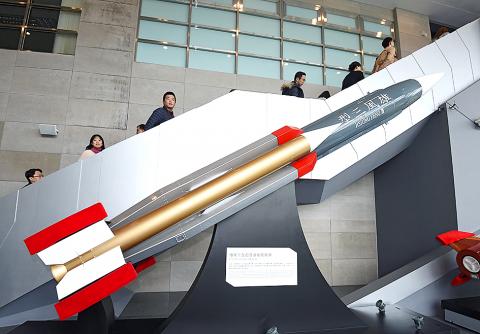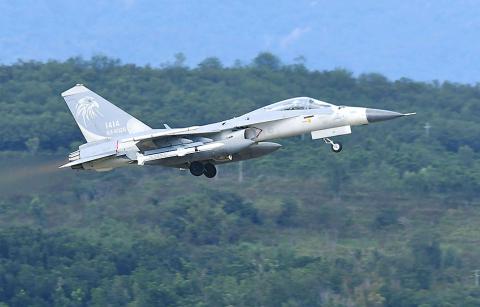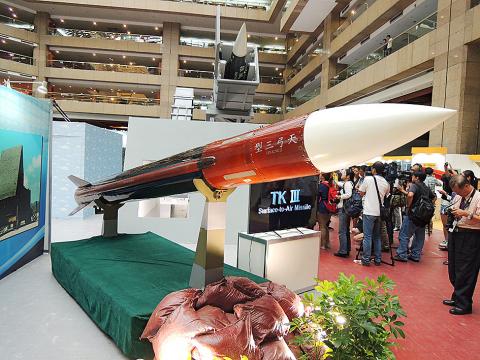Taipei and Washington have signed an agreement to share information on scientific research that would allow representatives of Taiwan’s research institutions, including the Chungshan Institute of Science and Technology and the Ministry of National Defense’s Armaments Bureau, to visit national defense research institutions and laboratories in the US next year, an unnamed senior military official said yesterday.
Such US facilities have never been open to Taiwanese researchers, the official said, adding that the deal would greatly benefit Taiwan’s self-defense capabilities, including the domestic production of military vessels and aircraft.
Cooperation with the US is expected to shorten the institute’s development and production time and could provide a breakthrough, as well as reduce the time needed for ongoing enhancement programs for the Tien Kung (“Sky Bow”) surface-to-air missile, the Tien Chien (“Sky Sword”) air-to-air missile and the Hsiung Feng (“Brave Wind”) anti-ship missile systems, the source said.

Photo: Liu Hsin-de, Taipei Times
It could also help the institute cut costs, the official said, adding that the benefits are difficult to measure.
The official did not specify which facilities Taiwanese representatives would be allowed to visit, saying that would depend on US officials.
Taiwan’s resources are limited, as the annual defense budget is only about US$10 billion, the official said, adding that as it is difficult to compete with China in terms of quantity, Taiwan needs to focus its resources on key projects.

Photo: Yu Tai-lang, Taipei Times
Although Taiwan is confident about its technological capabilities, the US is the world leader in the arms industry, said Democratic Progressive Party Legislator Wang Ting-yu (王定宇), coconvener of the Legislative Yuan’s Foreign Affairs and National Defense Committee.
If Taiwanese and US researchers can visit each other, it would help Taiwan achieve breakthroughs in military technology, he said.
More importantly, exchanges between researchers are on a higher level than joint military exercises, Wang said, adding that they would symbolize close relations with the US.

Photo: Lo Tien-pin, Taipei Times
The passage of US legislation that is advantageous to Taiwan, including parts of the latest National Defense Authorization Act and the Taiwan Travel Act, have created opportunities to facilitate equal and mutually beneficial exchanges between Taiwan and the US, said Chinese Nationalist Party (KMT) Legislator Lu Yu-ling (呂玉玲), the committee’s other coconvener.
However, as Taiwan is in desperate need of actual assistance from the US, mutual exchanges between military research institutions would provide a significant boost to Taiwan’s self-defense capabilities and the development of the domestic defense industry, she said.
As relations warm between North and South Korea, and North Korea and the US, Taiwan cannot become a bargaining chip in international relations, Lu said.
Aside from improving Taiwan-US relations, if Taiwan engages in further exchanges with the US military and research institutions, it could also improve the nation’s self-defense capabilities, in turn elevating its importance and position on the international stage, she said.

Tropical Storm Gaemi strengthened into a typhoon at 2pm yesterday, and could make landfall in Yilan County tomorrow, the Central Weather Administration (CWA) said yesterday. The agency was scheduled to issue a sea warning at 11:30pm yesterday, and could issue a land warning later today. Gaemi was moving north-northwest at 4kph, carrying maximum sustained winds near its center of up to 118.8kph and gusts of 154.8kph. The circumference is forecast to reach eastern Taiwan tomorrow morning, with the center making landfall in Yilan County later that night before departing from the north coast, CWA weather forecaster Kuan Shin-ping (官欣平) said yesterday. Uncertainty remains and

SEA WARNING LIKELY: The storm, named Gaemi, could become a moderate typhoon on Wednesday or Thursday, with the Taipei City Government preparing for flooding A tropical depression east of the Philippines developed into a tropical storm named Gaemi at 2pm yesterday, and was moving toward eastern Taiwan, the Central Weather Administration (CWA) said. Gaemi could begin to affect Taiwan proper on Tuesday, lasting until Friday, and could develop into a moderate typhoon on Wednesday or Thursday, it said. A sea warning for Gaemi could be issued as early as Tuesday morning, it added. Gaemi, the third tropical storm in the Pacific Ocean this typhoon season, is projected to begin moving northwest today, and be closest to Taiwan on Wednesday or Thursday, the agency said. Today, there would likely

DISRUPTIONS: The high-speed rail is to operate as normal, while several airlines either canceled flights or announced early departures or late arrivals Schools and offices in 15 cities and counties are to be closed today due to Typhoon Gaemi, local governments announced last night. The 15 are: Taipei, New Taipei City, Taoyuan, Tainan, Keelung, Hsinchu and Kaohsiung, as well as Yilan, Hualien, Hsinchu, Miaoli, Chiayi, Pingtung, Penghu and Lienchiang counties. People should brace for torrential rainfall brought by the storm, with its center forecast to make landfall on the east coast between tonight and tomorrow morning, the Central Weather Administration (CWA) said. The agency issued a sea warning for the typhoon at 11:30pm on Monday, followed by a land warning at 11:30am yesterday. As of

CASUALTY: A 70-year-old woman was killed by a falling tree in Kaohsiung as the premier warned all government agencies to remain on high alert for the next 24 hours Schools and offices nationwide are to be closed for a second day today as Typhoon Gaemi crosses over the nation, bringing torrential rain and whipping winds. Gaemi was forecast to make landfall late last night. From Tuesday night, its outer band brought substantial rainfall and strong winds to the nation. As of 6:15pm last night, the typhoon’s center was 20km southeast of Hualien County, Central Weather Administration (CWA) data showed. It was moving at 19kph and had a radius of 250km. As of 3pm yesterday, one woman had died, while 58 people were injured, the Central Emergency Operation Center said. The 70-year-old